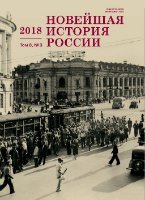Региональный опыт политических трансформаций в новейшей истории России: Кабардино-Балкарская Республика
Regional Experience of Political Transformations in Modern History of Russia: Kabardin-Balkar Republic
Author(s): A. Kh. Borov, K. F. Dzamihov, Kh. B. MamsirovSubject(s): Political Theory, Political history, Recent History (1900 till today)
Published by: Издательство Исторического факультета СПбГУ
Keywords: Russia; political transformations; North Caucasus; Kabardin-Balkar Republic; post-soviet transition; political institutions; democracy; modernization;
Summary/Abstract: In the studies of Russian regions’ political history during the transition period from soviet to modern federal statehood conditions for a qualitatively new stage has been matured. An active transformative phase of their political dynamics has come to an end not only in its institutional dimension but also in a broad cultural-historical sense. The possibilities are opening to get to theoretically meaningful interpretation of real outcomes of a transition period. Such a study would inevitably assume an interdisciplinary character, using hand in hand methods and conceptions of history and political science. It would be feasible to conduct it in reference to the case of the single subject of the federation so that the operating by the categories of political theory would allow coming to generalizations bounded by given regional context. The present article deals with the causal variables, mechanisms, and phases of a post-soviet political transformation of Kabardin-Balkar Republic in the 1990s and 2000s. In the 1990s political process in the Republic developed autonomously, correlating with all Russia’s transformative dynamics, but free from the direct control of federal-state powers. Interethnic frictions were the main “domestic” factor determining the course of political developments. Nevertheless, institutional results of systemic transformation embodied not the “soverignization”, separatist aspirations or ethnopolitical cleavage, but a general move of Russia toward democratic federalism. The further political development made it evident that in the legacy of the 1990-s integrative impulse as such were more essential than its democratic and federalist form. So, the Republic entered the general turn of Russia’s domestic politics toward the recentralization and strengthening of “power vertical” in the 2000s without any tension. Regional elites unequivocally upheld all the central state powers’ initiatives in an institutional restructuring of Russian federalism. When possibilities were opened to return to a more immediate representation of the population in regional Parliament and to direct election of the Head of Republic they were not made use of. So, political regime in modern Kabardin-Balkaria has so much similarity with the Soviet “nomenklatura” system that transition period between them may be correctly interpreted rather in terms of “metamorphosis” than of “transformation”.
Journal: Новейшая история России
- Issue Year: 8/2018
- Issue No: 24
- Page Range: 691-707
- Page Count: 17
- Language: Russian

